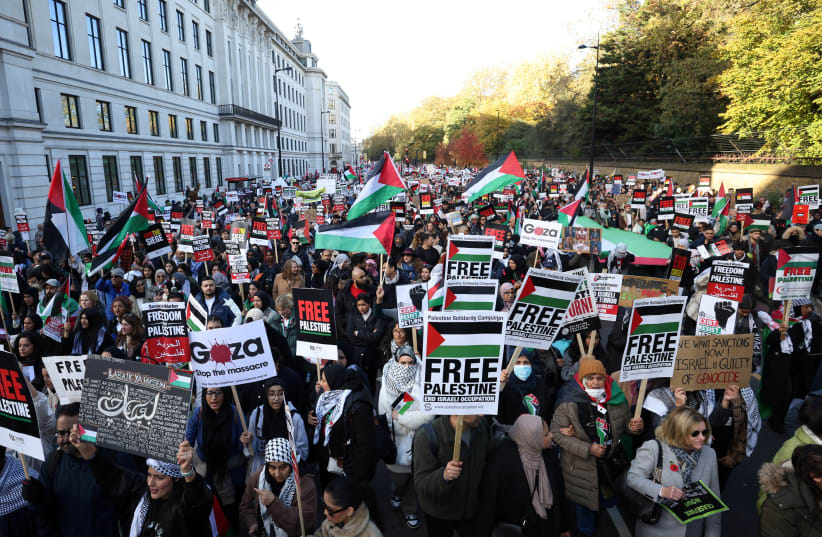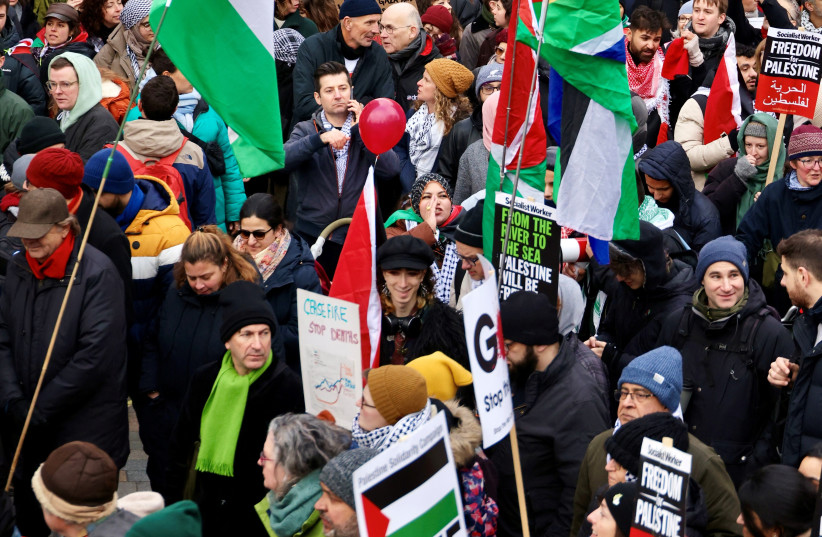I’ve spent a large part of my life working and traveling in Europe. During a recent trip to Vienna, for the first time since I can remember, I started feeling what it was like to have been a Jew in 1934. We had booked our trip several months before. Little did we know what would happen in our country on October 7, 2023. Nevertheless, we decided to go ahead with our journey to the Austrian capital, a city which carries with it a checkered history for its Jews. Well into December 2023, we were still unaware of how things would pan out for Israel and its citizens. Would there be any flights? Would the airport be open? Would we be able to fly? I resisted the temptation to cancel the whole trip.
One encouraging aspect of visiting Austria at a time like this is that the Austrian government has supported Israel. Austria was one of 10 countries that voted for Israel at the United Nations recently. This was certainly not the case in the rest of Europe, where new forms of antisemitism seem to have engulfed the whole of the European continent from Britain to the eastern borders.
Our week in Vienna went very smoothly, though we consciously avoided telling anyone, when asked, where we were from. It was only on the last day, a Sunday morning, when we were rudely reminded of the true reality of life in European cities. We were returning to our hotel after visiting an exhibition at the Leopold Museum. We were about to cross the main road at Schwedenplatz when we heard the sounds of honking vehicles, loud hailers, and shouting. The Sunday morning quiet was brutally interrupted by a cavalcade of cars covered in Palestinian flags. It was an extremely uncomfortable experience to see the malevolent faces of the demonstrators screaming from the car windows. Fortunately, they were not cheered on by any of the locals.
Today, there are over 25 million Muslims living in Europe. France tops the list with six million, followed by Germany, then the UK, Italy, the Netherlands, and Spain. Switzerland and Austria are at the bottom of the list with 600,000 and 500,000, respectively. It is little wonder that there are political shifts occurring in these countries, with most of their electorates veering toward the Right. Even as I write this, constant streams of illegal immigrants are still arriving on European shores. Almost 80% of these people are Muslims who are attracted to Europe in search of a better life. They are not welcome in countries run by their co-religionists, who cannot and will not allow them to enjoy the benefits of social services, free medical treatment, and education for their children. Unlike the immigrants who went to Europe and America in the early 20th century, today’s immigrants are not that interested in integrating into Western European society. Most see themselves as Muslims who will transfer their lifestyle, their dress codes, religious practices, and even their religious laws to their new countries. They are encouraged by the numbers of their kinsmen who have already established themselves in Europe, where many have built communities with their own schools, mosques, and even the institution of sharia law. In the UK, immigrants who arrived from predominantly Muslim countries have transformed their neighborhoods into places where they can feel at home with shops, greengrocers, supermarkets, coffee houses, and eateries that cater to their ethnic tastes. Some would argue that this is no different to the way Jewish immigrants settled themselves in large cities across the globe, especially in Europe before the Holocaust. What is different today is the pattern of radicalization among Muslim immigrants throughout the cities of Europe. A disturbing example of this were the attacks in Paris and Brussels in 2016. Last September, a Belgian court handed out sentences ranging up to life in prison to eight men for the 2016 jihadist bombings in Brussels, culminating in the country’s largest-ever criminal trial. The perpetrators came from all over Europe.
Since WW II, many European countries have been very welcoming to immigrants, especially those who hail from their former colonies. In France, however, the value of “secularism” in the country is of historical importance. The large immigration to France in the 1960s and 1970s created a variety of populations – Africans, Asians, and Muslims. In order to preserve the values of France, immigration laws were enacted, which included strict rules regarding religious dress code. Today, however, many years down the line, under successive governments these laws have not been reinforced. Children and grandchildren of immigrants have been able to take advantage of education to better their lives and their circumstances. They have caught on to the political systems of the countries in which they live. They have discovered the potential of gaining power in their local communities. Many have become educated in colleges and universities, where they have made successful professional careers. Some have entered politics and local government. They have become mayors, magistrates, and judges. They operate in all the major cities of Europe and are staunchly proud of their Islamic heritage and way of life. Recently in London, a jury found three people guilty of a terror offence after they displayed images of paragliders at a pro-Palestine march in the city. The judge, Tan Ikram, who decided not to punish three women displaying parachute images at a pro-Palestine protest, was found to have liked a social media post referring to “Israeli terrorists.” Former home secretary Suella Braverman called for a review of their sentences, citing the judge’s lack of impartiality in the case. Last week, the Tory administration removed the Whip from MP Lee Anderson for comments that he made about London’s Mayor Sadiq Khan:
He claimed that Khan had “given our capital city away to his mates.”
He said, “We’ve got a very cowardly Khan running London, and he seems to be letting not only the Jewish population down but the whole population of London, and Britain as a whole.”
This followed the shocking hijacking of the Houses of Parliament when pro-Hamas activists projected the inflammatory antisemitic slogan “From the river to the sea” onto the Big Ben clock tower.
As I write this, news has just emerged that the Tory government is to spend £31 million on protecting MPs, mayors, judges, and high-profile officials from harassment and attacks. British MPs have expressed growing concerns about their safety amid a surge in antisemitic and Islamophobic incidents since the October 7 terror massacre and subsequent war in Gaza. The latest “slap in the face” to British Jewry was the election of George Galloway to the UK Parliament. He won a landslide victory in the predominantly Muslim town of Rochdale in the north of England. The British Jewish Board of Deputies issued the following statement: “George Galloway is a demagogue and conspiracy theorist, who has brought the politics of division and hate to every place he has ever stood for Parliament. His election is a dark day for the Jewish community in this country, and for British politics in general. We believe he should be shunned as a pariah by all Parliamentarians.”
Antisemitism spreads across Europe in 2024
In 2024, the societal landscape of Europe has changed irreversibly. The Internet and social media platforms such as X (formerly Twitter), TikTok, Instagram, and the mainstream media in general have played an enormous part in shaping the opinions of young people across Europe.
A Jewish business colleague of mine in London told me: “It’s become a trend in London among the youngsters to embrace the Palestinian cause and Hamas. They can say or do anything, post anything, and nothing is done about it. Last week, two Jewish guys drove a van around London, displaying signs that Hamas and Islamic Jihad are terrorist organizations. They were attacked by Islamists, and their vehicle was smashed up.”
He went on to describe how fearful Jewish people are. “There are Palestinian flags and posters everywhere. Jewish passengers are verbally abused, spat on, and harassed on public transport.”
A non-Jewish colleague of mine who is a CEO in London and is sympathetic to Israel’s plight told me: “The UK is completely polarized, with half the nation rooting for Israel, while the other half support the Palestinians.”
When renowned singer Charlotte Church leads a 100-strong choir in the vile antisemitic “river to the sea” chant at a pro-Palestinian event in Wales, and real estate agent branch manager Amanda Hardy in Borehamwood near London (where many Jews live) posts, “The world is a better place with this Zionist dead. Just got to hope all the others follow” (referring to the recently deceased Lord Jacob Rothschild), then we know that European Jewry is in trouble.
During our stay in Vienna, we spent Friday night at Chabad House, where there were other Jewish visitors to Vienna. At dinner, we shared a table with a group of single friends from France who had decided to spend the weekend in the Austrian capital. They began to tell us how bad things are in Paris.
“It’s got to the stage where we are too nervous to leave the apartment after we get back from work. There are antisemitic incidents occurring in Paris almost every day.”
Sadly, this story repeats itself all over Europe as the trend continues. The frightening aspect of all of this is the failure of the authorities to do anything about the violent demonstrations and marches in the cities of Europe. The police are outnumbered, and the courts are reluctant and unable to convict the perpetrators. Some political commentators predict that this will eventually lead to the far Right gaining more ground in Europe. A recent study published by Euronews stated: “The far-Right surge could allow a coalition of Christian Democrats, Conservatives, and the radical far Right to piece together a majority and steer EU policy for the first time.”
Whatever the outcome, Europe’s future of disruption, violent demonstrations, and political divisiveness looms large, with Israel often being blamed and the Jews caught in the crossfire.■

